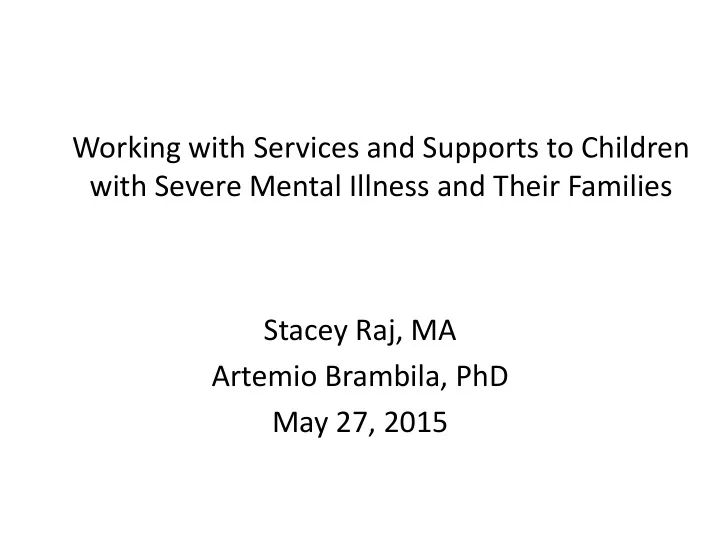

Working with Services and Supports to Children with Severe Mental Illness and Their Families Stacey Raj, MA Artemio Brambila, PhD May 27, 2015
Objectives 1. Develop familiarity with the Severe Emotional Disturbance (SED) classification for children/Adolescents. 2. Develop familiarity with services available to children with SED and what these services entail (e.g., day treatment, community support services, inpatient psychiatric hospitalization, etc.). 3. Recommend children/families for services and how to support families of children with SED.
Assessing Child/ Adolescent Functioning and Impairment and Justifying Level of Care • Child and Adolescent Functioning Assessment Scale (CAFAS) • Identifying risk and protective factors • Determining past interventions and outcomes
Outpatient Services • Psychotherapy • Medication management
Criteria for “higher level of care” Taken from New Mexico Human Services Department. Checklist is available at: http://www.hsd.state.nm.us/uploads/FileLinks/c06b4701fbc84ea3938e646301d8c9 50/5_BH_Checklist_SED.pdf
Comprehensive Community Support Services “CCSS includes: Assistance in development and coordination of a behavioral health Service Plan, which entails a recovery/resiliency management plan, a crisis management plan, and an advance directive when needed; • Assessment and support in crisis situations; • Service and resource coordination with the goal of attaining access to rehabilitative, and medical services; • Assistance with the development of interpersonal and community coping skills; • Encouragement in the development of natural support systems at the workplace or at school; • Assistance in learning to monitor symptoms and self-management skills; • Assistance in maintaining stable housing; • Multi-disciplinary follow-up to ensure CCSS needs are being met .” http://www.bhc.state.nm.us/BHCollaborative/CompCommSupportServices.html
Behavior Management Services • In home/ school/ community based • Help children/ families help manage behaviors in the least restrictive environment • Skills/ interventions may include; setting limits, time out, communication skills, role modeling, crisis de-escalation, recognizing cues of problem behavior, distractions, etc.
Behavior Management Services Agencies include: • www.deserthills-nm.com/programs/behavior- management • http://www.streetnm.org/services.html#BMS • http://www.openskieshealthcare.org/services.htm • http://hospitals.unm.edu/bh/children_adolescents.sht ml
Community Family Team (CFT) • In home/ school/ community based • Incorporates a range of evidence based practices (CBT, parent training, etc.) • Includes BMS, case management, crisis management, and collaboration with other systems (school, community, etc.)
Multi-Systemic Therapy (MST) • To support adolescents with multiple behavioral difficulties in their community • Evidence based intervention to support youth with chronic violent behavior and serious emotional problems (e.g., truancy, aggression, criminal behavior, drug/ alcohol problems, etc.) • Addresses: family relations, school performance, peer relationships, neighborhood, community relations.
Multi-Systemic Therapy Agencies include • www.swfamily.com/our-guidance-center/staff/albuquerque- area-clinicians/ • https://www.lafronteranm.org/ • http://hospitals.unm.edu/bh/children_adolescents.shtml
Higher Level of Care/ More Restrictive Day treatment “Desert Hills offers a comprehensive educational day treatment program that is designed to provide coordinated, intensive, and individualized therapeutic and educational services for children, adolescents, and their families who are living in the community. This program is held five days per week between the hours of 8:00am and 4:00pm and is available for 6 th -12 th grade students. This educational day treatment program is offered year-round and addresses both academic and behavioral issues .” http://www.deserthills-nm.com/programs/outpatient- clinic/day-treatment
Day Treatment includes… • Transportation • Breakfast and lunch • Education supports
Foster care/ Treatment foster care “The purpose of Treatment Foster Care is to place seriously emotionally disturbed children and adolescents in the homes of trained and licensed parents who are skilled in helping these young people develop appropriate skills and techniques for managing emotions and behaviors. The goal of this program is to work with the natural family and to reunite the child with their natural environment by providing weekly individual and family therapy in a temporary home environment that is conducive to healing and beneficial skill development .” http://www.deserthills-nm.com/programs/foster-care
Service providers include… • https://www.la-familia-inc.org/treatment-foster- care.php?layer=treatmentfostercarehome • http://www.deserthills-nm.com/programs/foster-care
Residential Treatment Centers “The foundation of our residential program focuses on teaching our patients that safe, positive, and appropriate behaviors lead to positive consequences and that acting in an unsafe, negative, and inappropriate manner leads to negative consequences. We use a cognitive behavioral therapeutic approach in the milieu of treatment, which includes a phase system that children move up in as they progress through treatment. Therapy focuses on not only the individual, but on his or her family as well. Focusing on the entire family unit is essential as guiding and facilitating an open dialogue, while also teaching appropriate intervention skills, assures success once children leave our program .” http://www.deserthills-nm.com/programs/residential
Service providers include… • http://www.deserthills-nm.com/programs/residential • http://www.peakbehavioral.com/
Inpatient Hospitalization
Service providers include … • https://www.phs.org/doctors-services/services- centers/behavioral-health/behavioral-health/Pages/inpatient- kaseman.aspx • http://hospitals.unm.edu/children/unmcpc.shtml
Other specialized services • Eating disorders • Substance abuse • Trauma
Challenges to accessing services • Location • Resources • Waitlists • Insurance • Stigma
Working with Families • How to support families • Pointing families in the right direction • Providing hope AND resources • Helping families navigate and coordinate multiple care providers • Recognizing limitations and challenges that families may face
Recommend
More recommend